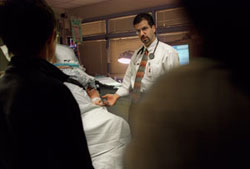|
|
|
Compassion and Communication Comfort Dying Patients
|
|
|
 |
|
|
Dr. J. Randall Curtis talking with a patient and family in an Intensive Care Unit.
|
|
|
|
|
|
|
|
According to a University of Washington research study, communication and emotional support are the two most important skills associated with quality medical care for dying patients.
“We found that patients cited emotional support most commonly among the skills they desire from their physicians,” said Dr. J. Randall Curtis, associate professor of medicine in the Division of Pulmonary and Critical Care Medicine. “Communication was also a priority for patients as well as for family members. We’re looking for specific ways that physicians can improve their communication and offer support.”
Curtis and his colleagues are working on several qualitative and quantitative research projects to better understand and predict good care for dying patients and to give feedback to health-care professionals to help them improve their skills. Two main focuses are understanding and improving communication between clinicians and patients, and developing and validating tools to measure and improve the quality of end-of-life care.
Focus groups gave perspectives from the different types of people participating in a terminally ill patient’s care. The focus groups included patients, families who had recently lost a relative, nurses, physicians, and social workers who work with dying patients.
 |
|
|
UW medical staff talks with the family member of a patient in an Intensive Care Unit.
|
|
|
|
|
|
|
The patients had chronic obstructive pulmonary disease, AIDS or cancer. Each group was asked to describe good skills and qualities of doctors caring for seriously ill patients, as well as areas needing improvement. Their comments were audiotaped.
One patient described a reputable, skilled oncologist who became irritated when the patient expressed fear. Another patient’s relative commended a compassionate triage nurse who always returned the family’s frequent telephone calls on the same day.
Five themes emerged as important for physicians caring for dying patients:
- Communication with patients and families, including listening and talking in an honest, straightforward way
- Cognitive skills and knowledge of pain and symptom management
- Affective skills such as emotional support and treatment of the patient as a person, and not as a disease or organ system
- Patient-centered values, including demonstrated respect and humility, as well as support for a patient’s decisions
- Patient-centered systems of care that encourage team communication and coordination
Curtis and his team are recruiting physicians in Washington state, Oregon, North Carolina and South Carolina to participate in further studies.
“We want to be able to present physicians with different approaches to difficult situations,” said Curtis. “Specifically we’ve found that communication and emotional support are areas that can be targeted for educational and research interventions.”
At the UW, medical student education emphasizes communication skills in the Introduction to Clinical Medicine I and II courses.
“Experiential learning with role-modeling and supervised training are the most effective methods for teaching communication skills,” said Curtis. “It’s not easy to teach these skills in a lecture.”
|













